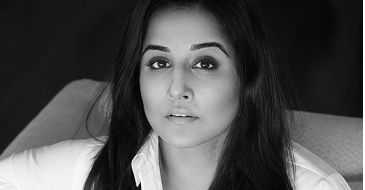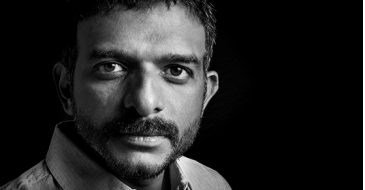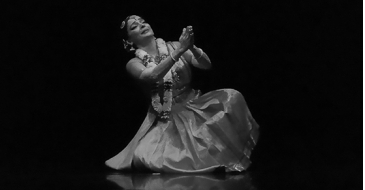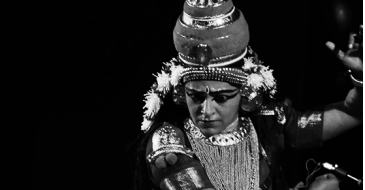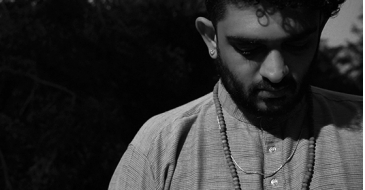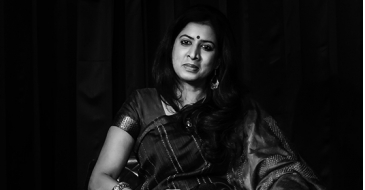Megha, when and how was Teething born?
Teething was born in Kottarakkara, a small town in Kerala. My memory of this place is rooted in my own childhood - following my grandfather into his tapioca fields, running around barefoot with my cousins and getting muddy, bathing in the canal and returning to the old house with our stomachs growling. By then our grandmother would have cooked the yam, and the tea would be warm and the verandah would be decorated with fireflies. Teething's world always existed, but poetry came into my life during college. I was cornered into loving poetry. Sometimes you do some things to stay alive, and for me, poetry was it. By the time I was in university, I was creating something so pure and precious, connecting the poems with this past world, and in the next two, three years that followed, I found this book breathing softly, its heart humming fiercely.
We love how the title of the book is so reflective of literally every poem in the book; a certain coming-of-age, a discovery, a coming to terms, a learning… and of teething itself which is such a bittersweet sort of sensation.
Thank you, the word is important to me. We're all teething in some way or the other, stumbling into adulthood with festering wounds. It's painful to grow up, but the process is inevitable.
Teething is about loving life, despite the world. Teething isn't merely a visual experience, it's also auditory and tangible and so many other things. It's a universe built on colours, perfumes, taste, touch, music. Teething is blue, with streaks of ivory and gold, and Teething is sweet and bitter on the tongue
In one of the poems, you speak of your mother's obsession for poetry being all about metaphors; your poems are so full of that; layered, and evocative… For instance, “Don't blame yourself for being a gorgeous Sunday afternoon somehow did not want to spend.”
It's strange that for a long time I had no idea I was using metaphors in my poetry. Writing poetry, confessional poetry, for me, has always been about spilling. Bleeding. I wasn't trying to make anything look beautiful or poetic. But one evening, sitting with a friend, I was told the trademark of my work was the metaphors that I played with. And I remember thinking, I wasn't trying to be special, I wasn't trying to capture the millennial zeitgeist, that was just the way my brain functioned. The sunset, for me, doesn't just look like a sunset. It's God spilling wine on the sky's party dress. I'm not just Megha. I'm magic that's meditating. My creative landscape is built on grandeur and exaggeration. Everything's magnified, intensified and incredibly overwhelming, it's how I'm wired. Ever since I was a child, I was impressed by the extraordinary, the transcendental. And that's what a metaphor is to me. Speaking in beautiful riddles. I'm in love with that…

We are curious about how you write; your writing process; your writing rigour…
Deep work is important for my writing. Cal Newport talks a lot about this in his book, Deep Work, and I couldn't recommend it enough. When I write, I unplug, I cut out all distractions. I do that thing where I pretend I'm in the matrix, and writing is my red pill. I like to lock the room, play jazz music and drink something, preferably black coffee with lots of honey in it, or sugarless tea (I tend to oscillate, depending on my mood) while I'm writing. I like to write the first draft with my hand. And I need to always know how a poem ends before I start writing one.
Teething oscillates between love and loss, hope and a sense of the broken…. What is it like to weave these two opposing emotions, in a sense, sometimes in the same line, or poem; for me, the entire book seems like a toast to life and its many realities; this is sort of a classic with you; talk to us about it?
Teething is about loving life, despite the world. Teething isn't merely a visual experience, it's also auditory and tangible and so many other things. It's a universe built on colours, perfumes, taste, touch, music. Teething is blue, with streaks of ivory and gold, and Teething is sweet and bitter on the tongue. It's a homage to everything I've ever felt. A book about grief's moments of blind hope, laughing through tears, living, loving, losing. It was vital to put the opposing emotions together, because all my life that's how I've felt. Lonely and loved in extremities. Broken and wistful. Devastated and yet, resurrected. These contradictory themes have always been the framework of my life. A pendulum life, I'd like to call it that.
There's also a quality of the vulnerable that is constantly underlying in your poetry; why is this quality so crucial when it comes to poetry?
Writing poetry is like writing your diary. And to write in a diary, you must write about your fears and dreams and desires and everything that makes you so preciously human. Your diary isn't where you talk about the weather or describe a fly on the wall. Your diary is nothing but documentation. You're trying to make sense of what you're going through. You need to bare yourself, strip to the bone for it. Brene Brown talks about this with the greatest precision in Daring Greatly. This is a quality, a strength, and society has fooled us into thinking it's a weakness. We need to be the counterculture, the nonconformists. We need to encourage emotional intelligence, not tell kids to stop crying but rather sit with them and check in with their feelings. Educational institutions should have a syllabus on self-compassion, on dealing with heartbreak, on healthy coping mechanisms. This isn't something crucial to just poetry, the world desperately needs it too.

When I write, I unplug, I cut out all distractions. I do that thing where I pretend I'm in the matrix, and writing is my red pill
Megha, Teething begins in Kerala, and then travels to Mumbai; from the coast to a 1BHK; those are also the two cities that you spend your time between; how personal are these poems, if at all?
It's semi-autobiographical. But all art is, isn't it? All art is personal, political, there's no question of that. Parts real, parts imagined. While Achu, the protagonist of Teething, does grow up in Kerala, she also moves away to college, finds herself in a bigger city. At some point, her family moves too, and because the book is fragmented and often dissociates – we don't know if they're living together or not. We don't know much about their timelines. She goes back and forth like a time-traveller because the entire book is happening inside her head. My experiences of living at home and in Bombay have definitely shaped Teething, but I always tell myself, while the setting is relevant to this book, its themes are more so. Adulting, scarring, loss of identity. Beauty, childhood, innocence, I can't seem to escape them. I found them everywhere, wherever I went.
What is also gorgeous is how you make “brokenness” and “devastation” almost seem beautiful with your words; for example, “I am relaxed ambulances heading home from the morgue, with the satisfaction that there is nothing left for you to kill.” Why is it crucial for us to confront brokenness and why is poetry that medium for you? How do you feel after you have put it all down? Is it a cathartic, almost?
It's cathartic to put it down. But showing it to the world, I don't know. It's a dream to see my book on a shelf, in a reader's hands, in print. But I also found myself wondering if I was being stupid. Who hangs their secrets in a picture frame? Who exhibits their scars in a museum? Who screams and howls and rips their heart out and calls it a live performance? I still don't know why I did it. I felt brave enough, but then there are also days when I think, Megha, you've exposed yourself. A stranger out there knows all the mysteries and vulnerabilities of your heart. Are you okay with that? And I guess I am. I never set out to make brokenness look beautiful. It truly isn't. But when you're broken, you still want to feel beautiful, so you begin to celebrate the fragments, find some disturbing sort of loveliness in the wounds. None of it is true. I wouldn't romanticize it. From a very young age, I've known how to make anything look pretty with my words. And now I can't seem to decide if that's kind or dangerous. But often I convince myself that this is my truth: I'm not trying to make anything look good. I'm only validating and honouring my feelings. I'm only trying to explain how I feel so I can feel better. And I do, I always do.
Interviewed by Akhila Krishnamurthy
0 comments Comments





